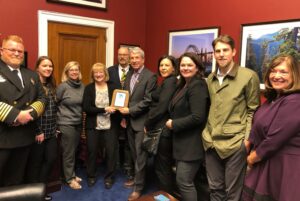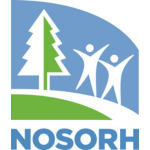Last month, NOSORH and 22 State Offices of Rural Health attended the National Rural Health Association’s Policy Institute in Washington, D.C. “NRHA did a great job of bringing together policymakers and rural stakeholders in a jam-packed week focused on rural health,” said Teryl Eisinger, NOSORH CEO.
During the week, NOSORH spent multiple days meeting with members and staff on Capitol Hill. With the prospect of major rural health legislation being advanced by Congress this May, NOSORH used the visits to remind Congress on the importance of rural health and advocate for continued funding for the SORH and Flex programs. It is anticipated in rural health circles that Congress could advance rural health legislation as part of a larger health package, including surprise medical billing.
A highlight of the NOSORH effort during the Institute was presentation of the NOSORH Legislator of the Year Award to Representative Kurt Schrader (OR 5th District). This award recognizes an outstanding individual federal legislator for their work and support of rural health initiatives that address national rural healthcare needs. Congressman Schrader’s district runs from the Pacific Ocean to the Cascade Mountains with 22 certified Rural Health Clinics, 6 rural hospitals, 17 rural EMS agencies and 2 tribal clinics. He is a leading member of the House Energy and Commerce subcommittee on Health and in 2018 was  the lead Democrat sponsor of the State Offices of Rural Health Reauthorization bill.
the lead Democrat sponsor of the State Offices of Rural Health Reauthorization bill.
The award was presented by Bob Duehmig, Deputy Director of the Oregon Office of Rural Health, during a meeting of rural Oregon constituents and members of the Oregon Office of Rural Health. “It was great to see Bob and his state team getting right to the heart of what matters in rural Oregon with Representative Schrader. Bob facilitated the discussion with each member of that state team ready with simple, meaningful input for Mr. Schrader,” said Eisinger.
Duehmig was one of the 46 state coordinators NRHA taps to help organize Hill visits during the Institute. Ten other SORH also served in this role. Thanks to the NRHA for sharing data and their great work of making our voice louder and building the momentum!
